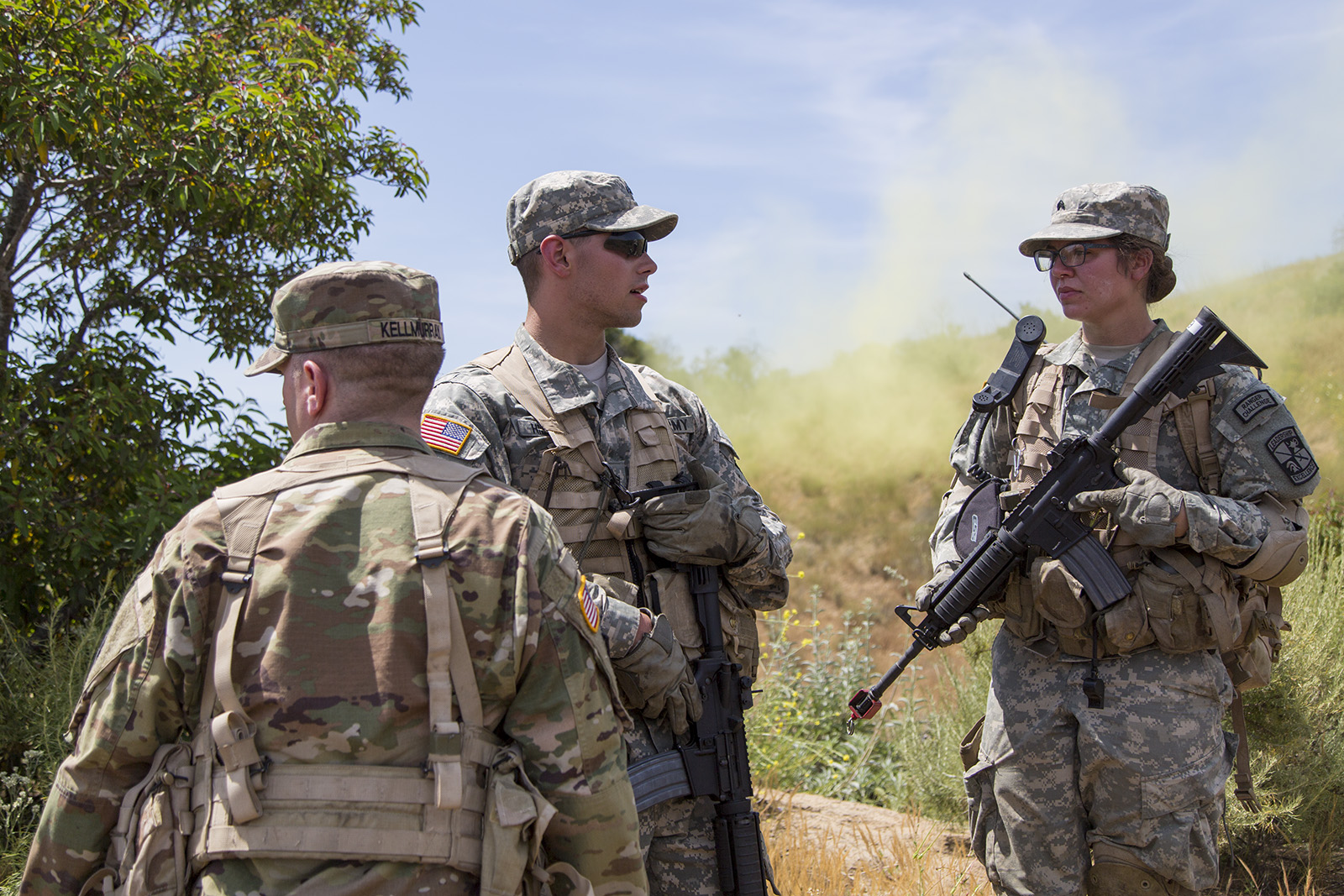ROTC cadets talk time commitment, handling finances

Katherine Knobloch, right, a third-year biology student, said ROTC has been a challenging but rewarding experience. (Kathy Chen/Daily Bruin)
By Hedy Wang
April 26, 2017 1:33 a.m.
This post was updated on April 27 at 4:40 p.m.
Katherine Knobloch wakes up every morning before dawn to train for combat before walking to her military science class at 8 a.m.
By the time many students wake up in the morning, she has usually already been working for four hours, but has yet to begin the rest of her day. Until the evening, she rushes between classes and her job at the UCLA Store.
Knobloch, a third-year biology student and U.S. Army Reserve Officers’ Training Corps cadet, is one of many college students who has looked to ROTC to finance their academic and professional goals.
ROTC offers scholarships to students training in the program to become officers in the army, often covering full tuition or housing costs for two to four years in exchange for four years of service following graduation.
Knobloch, who is originally from Virginia, looked to the military as a source of financial assistance and a pathway to medical school.
“I knew I wanted to go to med school,” Knobloch said. “But I knew it was going to be a burden on me and my family.”
Knobloch said she was not entirely sure if she was suitable for the military but applied to ROTC anyway after she had a positive experience visiting the United States Military Academy in West Point, New York, during her senior year of high school.
ROTC offered to cover 100 percent of Knobloch’s tuition for three universities, including UCLA, through scholarships. ROTC also gives her $400 per quarter to pay for textbooks and awarded her another $2,000 scholarship this year.
Even though ROTC is covering most of her educational expenses, Knobloch said she still struggles with other costs associated with being an out-of-state student. She works 15 hours a week in the store operations division of the UCLA Store to help pay for her extra expenses.
“Just getting back from the airport costs money,” Knobloch said. “I don’t have family in California, so where do I put my stuff? I have to pay for storage units.”
Knobloch added she has had to sacrifice much of her time and energy for ROTC.
“When I called UCLA and talked to former cadets, they made it sound very manageable,” she said. “They said it would only require six to nine hours a week. As the years have gone on … I have realized it is not that.”
Knobloch said she spends a minimum of six hours per day doing ROTC activities. Three days a week, she wakes up at 5:10 a.m. to be ready for physical training at 5:45 a.m. She then attends ROTC classes or training meetings until 9 a.m.
On Thursdays, she crawls out of bed at 3:20 a.m. to meet with other cadets by 4:35 a.m. and drive to an off-campus training site to practice battle strategies and tactical movements.
Every morning, she leaves with three bags to carry her school supplies, ROTC and work uniforms and three meals for the day.
“Waking up so early every day degrades your academic performance,” she said. “I know exactly … what my day is gonna look like. There’s not much room for impromptu fun things.”
Despite the mental and physical exhaustion, Knobloch said she never regrets joining ROTC.
“ROTC is like a full-time job,” she said. “It’s really tough, but … it’s given me a UCLA education … great friends, great training, awesome perspectives and the opportunity to travel to Morocco and Jordan.”
Many students turn to the military or military scholarships to help pay for college, said Adrian Huerta, a postdoctoral researcher at UCLA’s Higher Education Research Institute.
Huerta said he thinks military scholarships appeal to students because they are more guaranteed than other types of scholarships. He added some high school students put off college until after they have served in the military to take advantage of the GI Bill, a bill created after World War II that gives veterans benefits such as covering educational costs.
“Military recruiters specifically target low-income schools because they know how to pay (for college is) the biggest barrier for students,” Huerta said.
Other students said financial assistance was not their primary motivation for joining ROTC, but the scholarships were indeed part of the program’s appeal.
Brandon Hilleary, a third-year political science student, joined ROTC because the program made it possible for him to enroll in college and train for the military at the same time.
“I was interested in joining the army from a pretty young age,” Hilleary said. “But college was the most important thing, and the scholarship provided a combination of both.”

